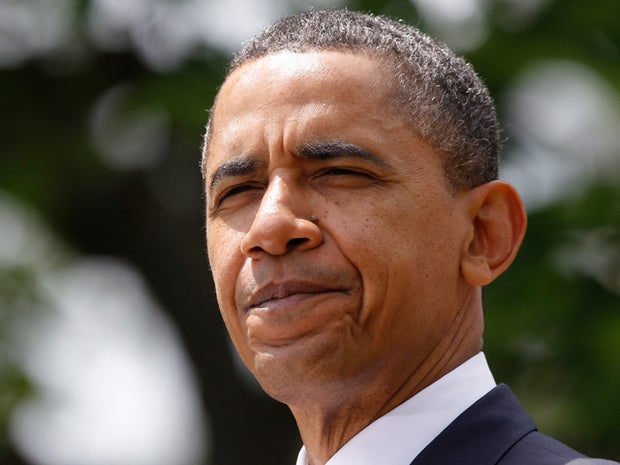Obama's poll boost didn't help economy ratings
This post originally appeared on Slate.
The operation that killed Osama Bin Laden has improved President Obama's poll numbers. In the CBS/New York Times poll released Wednesday morning, the president's approval rating jumped 11 points from the previous month. In the Washington Post/Pew poll released Tuesday and taken after Obama announced Bin Laden's death, his approval rating shot up nine points.
CBSNews.com special report: The killing of Osama bin Laden
Now if the president could only order a commando strike to bring down gas prices.
What's notable in these polls is not so much that Obama's numbers have improved. It's that, on the all-important question of handling the economy, he saw no improvement at all.
When people feel good about a president, that goodwill can bleed over to their feelings about his handling of other issues that aren't related to the underlying event. When Saddam Hussein was captured in December 2003, George W. Bush saw a similar increase in his approval rating to the one Obama does now--but he also saw improvement in his approval rating on the issue of the economy. In a CBS poll, his approval on that score increased five points, to 49 percent. (Bush's numbers would later fall.)
Obama's numbers on the economy have been flat or declining. In the Post poll, only 40 percent approved of his handling of the economy, unchanged from the previous survey in late April. In the CBS poll, 34 percent of the country approved of Obama's handling of the economy, down from 38 percent just a week ago. That's the president's lowest rating on the issue since coming into office.
George W. Bush benefitted from a different economic climate. In December 2004, Americans were concerned about the economy but their mood was improving. Fifty-five percent of the country said the economy was doing well, up five percentage points from the previous month and 10 points since that summer. People are in a funk right now. In an April 21 CBS poll, the share of Americans who believe the economy was getting worse increased by 13 points. In that survey, 80 percent of those polled said the economy was "fairly bad" or "very bad." Gas prices, which White House advisers blame for the shift, have increased 37 percent in the last year.
The way people feel about the president's handling of the economy will probably be the most important factor in his re-election. In this context a lot of people mention George H.W. Bush's plummeting poll numbers. His approval rating was 89 percent just after the end of the Gulf War, but by election time, it was below 40 percent.
The good news for Obama and his supporters is that as bad as the president's numbers are on the economy, Americans still trust him to handle the economy more than they trust Republican leaders. In a recent Gallup poll Americans' confidence in Obama's ability to do the right thing for the U.S. economy is down to 50 percent from 54 percent a year ago and 71 percent in 2009. But that's still higher than the 44 percent of those surveyed who have confidence in congressional Republicans.
If Republicans want to turn Obama into another George H.W. Bush, they will have to find a candidate who can take advantage of the economic situation the way Bill Clinton did. They're all trying, but so far none have broken through. "Job Creation Must Be Job One," reads an email this morning from Newt Gingrich to supporters. Mitt Romney, campaigning in New Hampshire, stressed that the enduring issue of the presidential race is the economy. Yet neither appears to be making much headway.
While the president's approval rating will almost certainly fall in the next 18 months, there is one probable enduring benefit to the Bin Laden operation. The president may now have a sturdier floor for his poll numbers. It is now much harder for Republicans to make the claim that Obama is not focused on the terrorist threat or the broader claim that when it comes to protecting America's interests, he can't take action. The president's opponents had made inroads on these issues. Last month, a Gallup Poll found only 52 percent of respondents thought he was a "strong decision-maker"--the lowest rating of his presidency.
Last week, the president's campaign sent an email to supporters entitled "Big Things." The message was that the president had taken on challenges that had bedeviled his predecessors. The email predates the Bin Laden operation, but reading it now, Obama supporters may be reminded that Bill Clinton tried to kill Bin Laden, and so did George Bush. Yet Bin laden remained hidden for 10 years after the attacks on 9/11. With constant focus and patience, Obama did what his predecessors could not. If the president can sell the country that message on the economy, perhaps his numbers will improve on that issue, too.
More from Slate:
The White House says Osama Bin Laden "resisted" capture. What does that mean?
Why did the military send a dog to help kill Bin Laden?
So many things could have gone wrong on the raid on Osama's compound

